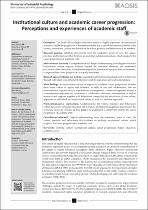| dc.description.abstract | The culture of higher education has a long and unique history, with the understanding that any
attempt to appreciate the processes within the system must have an advanced comprehension of
the culture of higher education (Callaghan, 2015). Moreover, higher education institutional
cultures have always been regarded as resistant to change (Maguad, 2018). However, a national
review, conducted by the South African Council on Higher Education (CHE, 2016), confirmed the
world-wide shifts in higher education, which necessitated the assessment and adjustment of
institutional cultures. The enormity of the barriers that an institutional culture could represent
has been acknowledged since the 1997 White Paper (Republic of South Africa [RSA], Department
of Education [DOE], 1997). Consequently, the CHE report appealed to the Department of Higher
Education and Training (DHET) to apply funding models that would enable a culture, conducive
to unlocking South Africa’s research potential, whilst developing and cultivating the academic
profession (CHE, 2016).
The academic profession, however, similar to all other professions, is subjected to unprecedented
challenges outside the scope of traditional continuity threats, such as the global pandemic,
coronavirus disease 2019 (COVID-19) (World Health Organization [WHO], 2020). The COVID-19
pandemic necessitated higher education institutions to respond, appropriately and efficiently whilst ensuring delivery during a sustained crisis. Academic
staff, therefore, were required to operate in a complex,
evolving and dynamic environment, which required an
institutional culture that was responsive to an era,
characterised by a flux of change (Waller, Lemoine, Mense,
Garretson, & Richardson, 2019). Career management and
progression are critical during times of complexity, more so
whilst engaging and cultivating key talent (Callanan, Perri, &
Tomkowicz 2017; Donohue & Tham, 2019; Janse van
Rensburg, Rothmann, & Diedericks, 2017a). Currently, the
success of a university, more than ever, is dependent on the
academic profession, their career progression and satisfaction,
as well as their commitment and motivation to achieve the
university’s desired level of educational services and quality
of scientific research (Szelągowska-Rudzka, 2018).
A focus on the career progression of academics, to address
the primary concerns regarding the academic staff in the
South African context, is further supported by the CHE
review (CHE, 2016, p. 208). These concerns include
recruitment, retention and equity of academic staff, as well as
the expected retirement rates, against the backdrop of a great
shortage of academics with suitable qualifications (CHE
2016, p. 290). Statistics confirm that South African universities
need more academic staff with doctoral degrees, particularly
from historically disadvantaged groups, to fill and increase
the academic pipeline (Breier & Herman, 2017). Although
academic exit, or turnover, is a global challenge, the capacity
and sustainability of South African higher education
institutions are threatened by the exodus of academics
(Callaghan, 2015; Mashile, Munyeka, & Ndlovu, 2021).
Furthermore, whilst it is difficult to appoint and retain
academic staff with high standing (Theron, Barkhuizen, &
Du Plessis, 2014), the CHE (2016) review acknowledges that
academia is in competition with career offers from
government, civil service and corporates, who all need to
access the pool of highly skilled South African Black and
women professionals.
Evidently, careers do not develop in isolation. Instead, careers
within organisations are shaped by the organisation’s strategy
(Schreuder & Coetzee, 2016) and, specifically, the organisation’s
culture (Grobler, Rudolph & Bezuidenhout, 2014). An
organisation’s culture, therefore, is a powerful source and
transmitter of social information, shaping individual career
motivations, decisions and behaviours (Hall & Yip, 2016). The
impact of culture on careers is not a new concept. Culture is
identified by Kanter (1984), as well as Schein (1985) as both a
cause and an effect on an employee’s move within and across
an organisation. Further studies highlight the need to
understand and consider the organisational culture as critical
for career management processes (Maher, 2017). Institutional
culture is identified as a key reason for academic turnover
(Mashile et al., 2021), together with the need for institutional
culture to support academic development and progression
(Lesenyeho, Barkhuizen, & Schutte, 2018). In a recent study,
academic staff identified institutional culture as a challenge for
their career management and progression (Barnes, Du Plessis,
& Frantz, 2021).With the challenges of higher education and the academic
career in mind, a comprehensive and deeper understanding
of any higher education institutional culture requires analysis
beyond the structural elements and established procedures
of the institution. An understanding of how individuals
interpret their environment, to support their career
progression, is equally vital. The objective history of any
given institution, combined with established institutional
norms, will result in a limited set of immutable outcomes
for any given situation (Tierney & Lanford, 2018). An
understanding of institutional culture allows real or potential
conflicts to be considered in the broader institutional life, and
not in isolation, whilst it allows the identification of structural
or operational contradictions that suggest tension in
the institution. In addition, it allows the evaluation and
implementation of everyday decisions, with a keen awareness
of its role in, and influence on institutional culture; provides
an understanding of the symbolic dimension of seemingly
instrumental decisions and actions; and considers why
various groups in the institution hold varying perceptions
about institutional performance (Tierney & Lanford, 2018).
It is against this context that the study aimed to establish and
present, from the academics’ point of view, the values,
practices and behaviours that facilitate an institutional culture
that supports the career progression of academic staff. | en_US |

